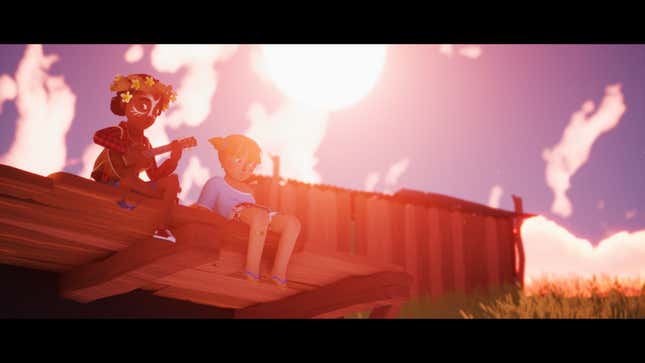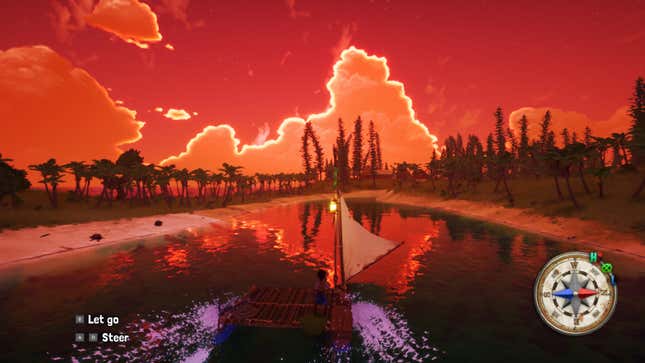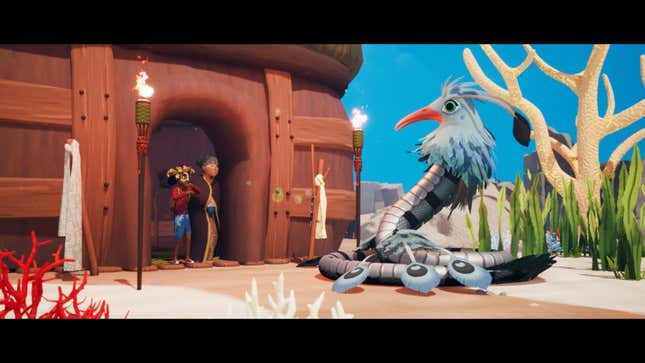
More often than not, open-world games grind against my own gaming sensibilities. I’m the type of person who’s very goal- and narrative-oriented, so the simple act of existing in a world can sometimes feel meandering—no amount of clearing dots off a giant map will hit the same as a crafted, linear experience.
But Tchia is one of the rare exceptions where, just as I’m about to get annoyed at how long it’s taking to traverse its tropical island world, the sunset’s light hits the water just right as my raft is passing over it, forcing me to stop and take in the view. In this moment of clarity, I realize that, despite some ongoing friction, I’m happy to be in this world.
I’m about eight hours into Awaceb’s open-world adventure game, and in a lot of ways, I have trouble quantifying it. Tchia draws inspiration from The Legend of Zelda: Breath of the Wild and Wind Waker, but it’s also packed with environmental interactions akin to an immersive sim, and isn’t focused on what would traditionally be considered “combat.” All of this is packaged within a tropical open world and all the map-wide collectathons and mini-games that entails, but Tchia lacks the same tight movement that makes those games not only a wonder to explore but easy to navigate. For every moment of serenity I find in it, there’s another moment of floaty imprecision to its movement and traversal that feels tedious and flimsy.

Tchia is a world worth stumbling through
When I finally arrive at my destination across one of Tchia’s several islands, I’m delighted by how much heart and humor each new character I meet brings to my journey, even if I’m just passing through. Tchia is about a young girl trying to save her father from a mysterious warlord after years of relative isolation on a remote island separated from most of the population. During the initial scuffle with the warlord’s goons, Tchia learns she can possess objects and animals, and thus begins her quest to not only understand her newfound abilities but how her family ties into the world at large.
As I make new discoveries about the nature of Tchia’s abilities and how she came to have them, I’m drawn in by its fantastical take on family drama, but also captivated by its secondary stories, as well. Characters like Louise, a farmer’s daughter who loves to sing and helps Tchia throughout her journey, colors the game’s story with the giddy excitement of a childhood crush, only for the dangers of this world to turn that into dire stakes. There’s a throughline of lost childhood that runs throughout Tchia, and thus far, I’m invested in where it goes.
It’s not all heavy and dour, though, because I’m consistently surprised at how funny Tchia can be, with entire comedic set pieces built into gameplay moments like turning an awkward high-five into a QTE that lasts just long enough not to overstay its welcome. The game balances different tones and moods well, and the levity always comes just as it threatens to tilt towards too much darkness. But that levity has yet to compromise the gravity of its story of warlords and the people crushed in their grip. Tchia goes to great lengths to show that people have been affected by this conflict, but they haven’t lost hope in each other and a desire to build community in these hard times.

Tchia’s early hours mostly avoid combat in favor of exploration, small puzzles and minigames like stacking rocks, carving statues, and playing Tchia’s ukelele. I’m given a slingshot at the very beginning of the game, but it’s more useful for knocking fruit out of trees than fighting. While there are dangers to be found, most of Tchia is spent exploring and learning about its world and its people.
Tchia is pretty systems-heavy in terms of the ways you interact with the world and traverse it. The titular protagonist has the ability to possess animals and inanimate objects, and almost all of them have more effective ways of getting around than she has on foot or by raft. Birds can fly over most of an island and fish can swim through the ocean often much faster than Tchia can. But this possession is limited, and I can only maintain it briefly before I need to recharge my energy at a campfire or by eating some food.
Some of my most satisfying moments in Tchia are hopping from vessel to vessel, like rolling as a stone across a long stretch of land and jumping to a bird I see flying overhead. The limitations breed innovation and give me moments to bask in the world around me, but as Tchia’s own movement feels so limited and floaty compared to anything I could possess, the limitations can often feel like stopgaps.
That sense of stop and start becomes more apparent the more the game introduces new enemies that bind Tchia and, rather than holding her in place, cause her to stumble and fall to the ground. Tchia’s floaty physics once again rear their head here. I had multiple instances where I would be caught in an enemy’s grasp and Tchia would stumble to the ground, then roll off the side of a raised platform. I’m still not sure if this is an intentional design choice or if it’s just the consequence of a game that’s physics never keep its main character’s feet steady on the ground, but Tchia’s physics often feel less like a tool to adapt to than a hinderance to an otherwise fluid experience.
Music helps establish Tchia’s sense of place
Awaceb has been upfront that Tchia is inspired by the developer’s home of New Caledonia, an archipelago off the coast of Australia, and its focus on getting local talent for its music leaves a strong impression. Between the score, vocal tracks, and having a ukelele as a mechanic (think a cross between a Zelda instrument and The Last of Us Part II’s guitar segments with an actual rhythm game element), Tchia’s music is key to coloring in its world.
Read More: That Ukelele At The Sony Event Looked Mighty Familiar
Even as I type this, the song Tchia’s father sings to her in the opening hour just before trouble comes calling is playing in my head. It feels authentic, both in its commitment to capturing a sense of place and in keeping music tied to its design. It’s yet another lovely touch in a game full of lovely touches from a team that clearly has a lot of pride for the place they come from and wants to share it with others.
I’m enjoying Tchia a lot. Its focus on community, culture, and a sort of oneness with its world has kept me going past a lot of initial frustrations, but even as I find myself drawn into its world, I still feel like I’m learning how best to make my way through it. Traversal is always the biggest hurdle any open-world game has to clear for me, and Tchia’s ideas are at the very least more interesting than getting on a horse in Skyrim or a car in Grand Theft Auto.
But much like Breath of the Wild that inspired it, my respect for its systems and limitations are also part of what makes it contentious for others. Tchia’s not a masterclass in its execution, but its ambition is respectable, and above all else, it runs into walls headfirst, with a sense of gusto I can’t help but be captivated by.